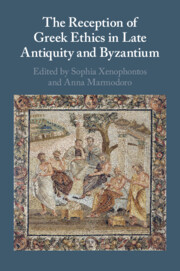Book contents
- The Reception of Greek Ethics in Late Antiquity and Byzantium
- The Reception of Greek Ethics in Late Antiquity and Byzantium
- Copyright page
- Contents
- Tables
- Contributors
- Acknowledgements
- Abbreviations
- Introduction
- Part I Ethics across the Late-antique and Byzantine Period
- Part II Prominent Ethical Views of the Time
- Chapter 9 The Ethos of a Theologian
- Chapter 10 Porphyry on Justice towards Animals
- Chapter 11 Eustratius of Nicaea and the Nicomachean Ethics in Twelfth-century Constantinople: Literary Criticism, Patronage and the Construction of the Byzantine Commentary Tradition
- Chapter 12 Michael of Ephesus on the Relation of Civic Happiness to Happiness in Contemplation
- Chapter 13 George Pachymeres’ Commentary on Aristotle’s Nicomachean Ethics
- Bibliography
- Index Locorum
- Index of Names and Subjects
Chapter 10 - Porphyry on Justice towards Animals
Are Animals Rational and Does It Matter for Justice?
from Part II - Prominent Ethical Views of the Time
Published online by Cambridge University Press: 15 June 2021
- The Reception of Greek Ethics in Late Antiquity and Byzantium
- The Reception of Greek Ethics in Late Antiquity and Byzantium
- Copyright page
- Contents
- Tables
- Contributors
- Acknowledgements
- Abbreviations
- Introduction
- Part I Ethics across the Late-antique and Byzantine Period
- Part II Prominent Ethical Views of the Time
- Chapter 9 The Ethos of a Theologian
- Chapter 10 Porphyry on Justice towards Animals
- Chapter 11 Eustratius of Nicaea and the Nicomachean Ethics in Twelfth-century Constantinople: Literary Criticism, Patronage and the Construction of the Byzantine Commentary Tradition
- Chapter 12 Michael of Ephesus on the Relation of Civic Happiness to Happiness in Contemplation
- Chapter 13 George Pachymeres’ Commentary on Aristotle’s Nicomachean Ethics
- Bibliography
- Index Locorum
- Index of Names and Subjects
Summary
This paper focuses on Porphyry’s account of the just treatment of non-human animals in his treatise On Abstinence from Killing Animals. In responding to the Stoic argument that justice extends only to rational beings and leaves out non-rational animals, Porphyry introduces a number of considerations to show that animals are not entirely deprived of reason. It is usually assumed that Porphyry thereby commits himself to the view that animals are rational, thus breaking from the tradition of treating rationality as distinctive of humans. This assumption has been recently challenged by G. Fay Edwards, who argues that Porphyry neither believes that animals are rational nor that justice extends only to rational beings, but that he is merely trying to trap the Stoics into admitting that animals are rational and for this reason recipients of justice. I will argue that Porphyry ascribes rationality to animals, although he does not think that this is the reason for treating them justly. Central to my interpretation is Porphyry’s claim that rationality admits of degrees, which allows him to ascribe to animals a certain level of rationality without compromising his Platonic ideals.
Keywords
- Type
- Chapter
- Information
- The Reception of Greek Ethics in Late Antiquity and Byzantium , pp. 174 - 192Publisher: Cambridge University PressPrint publication year: 2021

